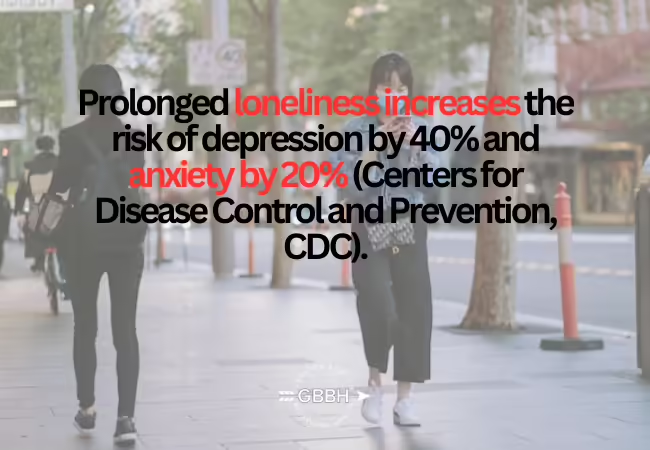The global pandemic introduced a unique challenge for people across the world: maintaining emotional well-being while staying physically apart. For many, the resulting isolation and loneliness significantly impacted their mental health. But with the right strategies and resources, it’s possible to navigate these feelings and emerge stronger.
In Boston, where the bustling streets and social hubs came to a halt during lockdowns, many individuals found solace in seeking professional help and engaging in self-care routines. If you’re experiencing loneliness or isolation, behavioral health support in Boston can be a vital resource for reclaiming your emotional balance.
Why Isolation Affects Mental Health
Humans are social beings. Our mental and emotional health thrives on connections—with family, friends, and communities. When social distancing separates us from these essential ties, the following challenges often arise:
- Increased feelings of loneliness: Prolonged separation can heighten the perception of being alone.
- Stress and anxiety: Uncertainty about the future adds to mental strain.
- Worsening of existing conditions: Those already managing mental health disorders may find their symptoms intensifying.
Addressing these issues early is crucial. Engaging in structured support, such as DBT Therapy (Dialectical Behavior Therapy) or CBT Therapy (Cognitive Behavioral Therapy), can help you develop skills to manage stress, regulate emotions, and foster a sense of connection despite physical distance.
Practical Strategies to Overcome Isolation
- Establish a Daily Routine Consistency can bring a sense of normalcy and control. Set aside time for work, exercise, hobbies, and connecting with loved ones.
- Leverage Technology for Social Interaction Virtual platforms have made it easier than ever to stay connected. Schedule regular video calls or join online communities to foster relationships.
- Engage in Physical Activity Exercise doesn’t just benefit your body—it’s a powerful tool for mental well-being. Regular movement releases endorphins, reducing feelings of stress and improving mood.
Strategies to Overcome Isolation and Loneliness
Coping with loneliness during social distancing requires intentional effort and practical strategies. The following approaches can help:
1. Maintain Social Connections
Even in the absence of physical proximity, staying connected with loved ones is crucial for emotional well-being.
- Video Calls and Messaging: Schedule regular calls with friends and family to maintain meaningful relationships.
- Virtual Social Events: Participate in online book clubs, trivia nights, or fitness classes to engage with others.
- Reach Out Regularly: A simple text or call to check in can strengthen bonds and reduce isolation.
2. Develop a Daily Routine
A consistent routine provides structure, predictability, and a sense of accomplishment.
- Set Goals for Each Day: Whether it’s completing a work task, trying a new recipe, or exercising, daily goals help maintain focus.
- Incorporate Self-Care: Schedule time for activities that bring joy, such as reading, painting, or listening to music.
- Exercise Regularly: Physical activity improves mood, boosts energy, and reduces stress hormones.
3. Limit Negative Media Exposure
Overconsumption of distressing news can heighten anxiety and feelings of helplessness.
- Set Time Limits: Allocate specific times for checking news or social media.
- Focus on Positive Stories: Look for uplifting or inspiring content that reinforces hope and optimism.
- Choose Trusted Sources: Avoid sensationalized media and stick to reliable outlets for updates.
4. Engage in Mindfulness Practices
Mindfulness helps individuals stay present and reduces the mental chatter associated with loneliness.
- Meditation: Use apps or guided videos to practice mindfulness meditation, even for a few minutes each day.
- Deep Breathing: Simple breathing exercises can calm the nervous system and reduce stress.
- Gratitude Journaling: Write down things you’re grateful for each day to shift focus from isolation to positivity.
5. Seek Out New Opportunities for Connection
Social distancing may limit traditional interactions, but it also opens doors to new possibilities.
- Join Online Communities: Platforms like Meetup or Facebook Groups offer virtual spaces for shared interests.
- Volunteer Remotely: Helping others fosters a sense of purpose and connection, even from a distance.
- Take a Class or Learn a Skill: Virtual courses provide opportunities to meet like-minded individuals while acquiring new knowledge.
Building Resilience for Long-Term Well-Being
Overcoming isolation isn’t just about addressing immediate loneliness—it’s about developing resilience to thrive in the face of future challenges.
1. Focus on Personal Growth
- Use the time to develop new skills, hobbies, or personal projects.
- Reflect on personal values and set long-term goals.
2. Strengthen Emotional Regulation
- Practice self-compassion and acknowledge that loneliness is a common human experience.
- Use techniques from therapies like DBT to manage intense emotions.
3. Build a Sustainable Support Network
- Cultivate relationships that extend beyond social distancing measures.
- Explore local resources in behavioral health in Boston for ongoing support.
The Role of Professional Mental Health Support
Isolation and loneliness can have profound effects on mental health, but you don’t have to face them alone. Professional mental health treatment centers in Boston provide targeted support to address these challenges.
Mental health treatment programs often include therapies such as DBT Therapy and CBT Therapy, which are designed to:
- Build coping skills
- Improve emotional regulation
- Address negative thought patterns
At Greater Boston Behavioral Health, we offer comprehensive services to help individuals regain control of their mental well-being. Our treatments include
We understand that every individual’s journey is unique. That’s why we tailor our care to meet your specific needs, whether you’re managing anxiety, depression, or other mental health concerns.
How Greater Boston Behavioral Health Can Help
Located in Needham, MA, our mental health treatment center in Boston offers a compassionate, supportive environment where individuals can focus on their recovery. Our expert team is dedicated to providing the highest quality care through evidence-based therapies and personalized treatment plans.
Our Services Include:
- CBT Therapy and DBT Therapy for emotional regulation and cognitive restructuring.
- Mental Health Treatment Programs tailored to your unique needs.
- Virtual therapy sessions to ensure access to care during periods of social distancing.
- Holistic approaches, including mindfulness, relaxation techniques, and creative therapies.
We proudly offer an employee assistance program, recognizing the importance of workplace mental health support. By addressing the unique challenges faced by working professionals, we help organizations create healthier, more supportive environments for their teams.
Reclaim Your Mental Wellness
Social distancing doesn’t have to mean emotional isolation. With the right resources and a commitment to self-care, you can overcome feelings of loneliness and rediscover the joy of connection. Whether it’s through small daily practices or seeking professional help, every step you take is a step toward healing.
Explore our mental health therapy programs and let us help you build a brighter, healthier future. Reach out to our team today to learn more about our services and how we can help you overcome isolation and loneliness.
Final Thoughts
Isolation and loneliness during social distancing are significant challenges, but they don’t have to be insurmountable. By implementing proactive strategies, seeking professional support, and focusing on building resilience, individuals can navigate these difficult times and emerge stronger.
If you or someone you know is struggling with loneliness, Greater Boston Behavioral Health is here to help. Contact us today at (888)278-0716 to learn more about our programs and take the first step toward connection and emotional well-being.
FAQs on Overcoming Isolation and Loneliness
What causes loneliness during social distancing?
Loneliness during social distancing is often caused by limited physical interaction, disruption of routines, and reduced access to support systems, leading to feelings of disconnection.
How can I stay connected while social distancing?
You can maintain connections through video calls, virtual events, online communities, and regular communication with friends and family via messaging or phone calls.
What are effective ways to cope with isolation?
Effective strategies include maintaining a daily routine, practicing mindfulness, engaging in hobbies, joining virtual groups, and seeking professional support through therapy.
Can professional therapy help with loneliness?
Yes, therapies like CBT Therapy and DBT Therapy help address the negative thought patterns and emotional challenges associated with loneliness, providing tools for resilience.
What is CBT Therapy, and how does it help with isolation?
CBT Therapy focuses on identifying and challenging negative thoughts, helping individuals develop constructive coping mechanisms and improve emotional well-being.
What is DBT Therapy, and how does it assist with loneliness?
DBT Therapy emphasizes mindfulness, emotional regulation, and interpersonal effectiveness, helping individuals manage feelings of loneliness and build stronger connections.
Are there support groups available for loneliness in Boston?
Yes, virtual and in-person group therapy options are available through programs like those at Greater Boston Behavioral Health, offering a sense of community and shared understanding.
How can Greater Boston Behavioral Health help me overcome isolation?
We provide:
- CBT and DBT Therapy tailored to individual needs.
- Virtual and in-person Mental Health Treatment Programs.
- Holistic approaches, including mindfulness and creative therapies.


